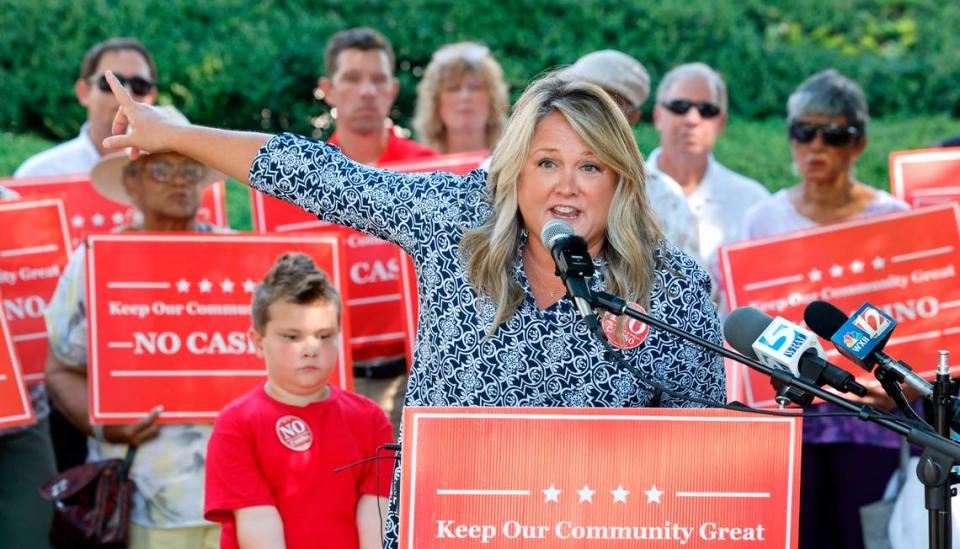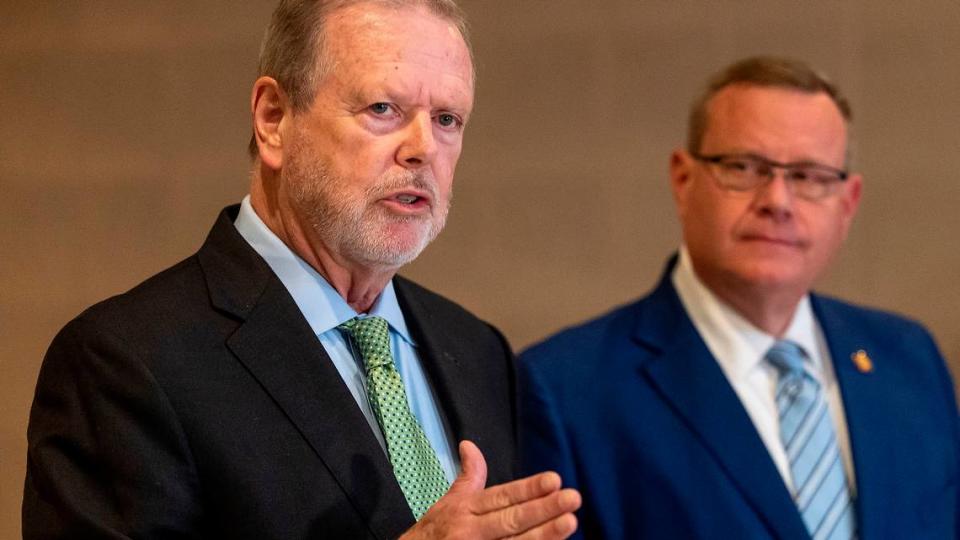We tested the transparency of NC legislators. Their emails show pleas to reject casinos.
As a controversial plan to green-light new casinos threw a wrench into budget talks between the state House and Senate last September, North Carolina lawmakers continued to hear from constituents urging them to reject it.
On Sept. 19, the day months-long budget negotiations finally concluded as GOP legislative leaders announced they were shelving the casino proposal for the time being and moving forward with the $30 billion budget as planned, the emails from constituents kept coming in.
People from around the state, particularly those who lived in the communities that had been floated as possible sites for major new casinos and entertainment districts, urged Republican lawmakers to “stand up against bully tactics” and oppose the proposal.
Some complained that the casino push was holding up a budget that contained delayed raises for teachers, bus drivers and state employees. Others wrote to lawmakers that key supporters of the gambling bill, like Senate leader Phil Berger, were ignoring the concerns of constituents back home and pursuing casinos “behind our backs.”
The News & Observer obtained these emails and many others through a public records request made of all 170 members of the House and Senate in mid-October, after GOP lawmakers moved to exempt current and former legislators from having to comply with the state’s public records law.
That change to state law, which was included in the 625-page budget Republicans unveiled on Sept. 20 and approved two days later, was strongly criticized by open government advocates, as well as political groups on both sides of the aisle. The budget was ultimately enacted into law in early October, putting the public records provision into immediate effect.
To test how responsive lawmakers would be to such requests under the new provision that gave them explicit legal authority to decide what would constitute a public record, The N&O requested from each member all of their communications for a single day: Sept. 19, the day the budget impasse between the two chambers was resolved.

Fewer than 20% of lawmakers provided records
A total of 31 lawmakers — 10 Republicans and 21 Democrats — provided The N&O with copies of emails from that day. The vast majority — more than 120 out of the 170 — did not respond.
Of those who did share their records, some provided just a handful of emails. Others provided hundreds of pages of emails.
The bulk of the records lawmakers handed over contained standard emails one would expect to find in an average elected official’s inbox: messages from constituents, requests for media interviews, invitations to speak at and attend conferences and other public events, daily newsletters and common press releases.
Few lawmakers turned over any direct communications with staff, fellow members of the General Assembly or other officials in state or local government.
Some responded to The N&O by saying that they were withholding emails exchanged with other lawmakers or staff because of “legislative privilege,” an often-cited justification that lawmakers have invoked in the past to deny internal communications about 2016’s House Bill 2 dealing with LGBTQ+ rights, and which came up in a voter ID lawsuit ahead of the 2020 elections.
Others said they reviewed their records and didn’t find any emails from the day in question.
Of the several emails lawmakers received from constituents on Sept. 19, many concerned the casino proposal, which had been discussed by top Republicans behind closed doors all summer, and which by mid-September had become the last item holding up a budget deal as negotiations between the House and Senate appeared to stall.
Other issues people wrote about included Medicaid expansion, masking requirements, charter school funding, environmental concerns about the annual regulatory reform bill, implementation of the GOP’s recently enacted “Parents’ Bill of Rights,” and support for stricter gun regulations like more thorough background checks and a ban on assault rifles.
Rendering the public records law ‘meaningless’
Lawmakers were already considered the custodians of their records under state law, and could shield certain records from disclosure if they claimed an exemption to the law.
The provision tucked inside last year’s budget broadened that authority to say that lawmakers “shall not be required to reveal or to consent to reveal any document, supporting document, drafting request, or information request made or received by that legislator while a legislator.”
The effect of the new provision, The N&O reported in September, was to essentially grant members of the General Assembly explicit authority to determine if any of their records should be public.
Brooks Fuller, the director of the NC Open Government Coalition, told The N&O at the time that the change was “one of the most brazen and troubling rollbacks of access to public records as it pertains to the General Assembly that I’ve ever seen,” and said it could effectively render the law “meaningless” when it came to compliance by state lawmakers.

Other critics of the provision included the ACLU of North Carolina and the John Locke Foundation, which said that instead of shielding themselves from the public records statute, lawmakers should have enshrined the public’s right to those records in the state constitution, citing the example of Florida.
In September, when reporters asked who had requested the provision’s inclusion in the budget, legislative leaders said they didn’t know, and downplayed concerns about transparency.
As the budget headed toward gaining final approval, Berger said the law needed to be changed to resolve a dispute over archiving between the legislative services office at the General Assembly and the Department of Natural and Cultural Resources.
When The N&O asked DNCR about the dispute, however, a spokesperson for the department said archives staff met with legislative services staff in 2021 and “last answered their questions on this topic over a year and a half ago.” As of September, the department wasn’t aware of any ongoing dispute, the spokesperson said.
‘Paying no attention’ to constituent concerns
Opposition to the proposed gambling expansion, which called for three casinos to be built on nontribal lands in rural parts of the state, continued to grow over the course of the summer as the plan appeared to move closer and closer to fruition.
A Maryland-based casino developer hired powerful lobbyists and purchased land in counties that had been floated as possible sites. Residents in those communities organized and spoke against the proposal at county commission meetings, and at the legislature.
With the proposal emerging as the final obstacle blocking an already months-delayed two-year state budget from moving forward, the pressure intensified on both rank-and-file Republicans to oppose new casinos, and on GOP leaders to reach a deal.
On Sept. 19, in the lead-up to the impromptu evening press conference where Berger and House Speaker Tim Moore announced they were moving forward without the casino proposal, emails to both Republicans and Democrats continued to pour in.
A woman from Stokesdale, the home of a camp for children with special needs that would’ve found itself neighboring the proposed location for a casino in Rockingham County, wrote to multiple GOP lawmakers that it was “beyond time to stand up against bully tactics” and “draw a line and put an end to” the push to include casinos in the budget.
“Senator Berger and his allies are holding up resources that will benefit hundreds of thousands of lower income NC residents, teachers, bus drivers and other state workers,” wrote the woman, who added that she had heard from Republicans and Democrats “that they are against what (Berger’s) trying to do and the process he’s using.”
In another email, a woman from the nearby town of Madison wrote to multiple Republicans that Berger was “paying no attention” to the concerns of local residents, and was pursuing a new casino “behind our backs.”
“I am reaching out to you in hopes that you are one of those who understand that this is not the way to bring jobs to our county,” the woman wrote. “We need jobs with good training, not ones that will suck the life and money out of our citizens.”
Responding to the concerns constituents raised in these emails, Lauren Horsch, a spokeswoman for Berger, said: “Sen. Berger is frequently back in his district and remains in regular contact with constituents when he is Raleigh for legislative work.
“When Sen. Berger talks to constituents in the district about the job creation and economic impact of Rural Tourism Districts, he hears positive feedback and support.”
Conservative group marshaled opposition
Others, by going to the website of the N.C. Values Coalition, sent their representatives in the House and Senate emails urging them to vote “for a pro-values budget WITHOUT predatory gambling.”
The conservative Values Coalition was a major supporter of many GOP priorities this year, including the state’s new 12-week abortion ban, but strongly opposed the push for casinos that had delayed a budget for nearly three months that contained funding for crisis pregnancy centers and universal school choice.
Nearly 500 people sent lawmakers emails using the template the Values Coalition put together, according to its website.
“To elevate the importance of casino cesspools and video lottery terminals above protecting unborn babies and educational choice, as well as a host of other good budget initiatives, is unconscionable,” the emails stated.
“Gambling is not a conservative value. It’s a destructive force that will leave a swath of devastation and destruction in our state by increasing addiction, crime, human trafficking, and family breakdown.”
In another email opposing the casino proposal, a Summerfield woman wrote that she and her family lived minutes away from Rockingham County, and were staunchly against the introduction of a casino to their community.
“There’s no reason increased tax revenue could ever justify what comes with a casino,” the woman wrote.
“It is especially insidious when donor dollars from these casinos and associated developers are flowing into PACs where top leadership in our State are involved. It shows clear failure of leadership when a politician has to resort to developing a casino in order to create jobs.”
Four donors linked to Maryland-based casino developer The Cordish Cos. gave $34,400 in campaign contributions to eight state lawmakers from November 2022 to March 2023, Carolina Public Press reported.
And between 2019 and 2022, donations to North Carolina’s state lawmakers from across the video gambling industry reportedly totaled nearly $900,000.
A separate bill filed last year to legalize and regulate tens of thousands of video lottery terminals scattered throughout the state appeared to stall at first, before GOP lawmakers included it as a part of the legislation to approve new casinos.
The effort to push casino approval through has also involved some of the state’s most powerful and well-connected lobbyists on both sides of the aisle.
How to read the emails NC lawmakers provided
The N&O has made all of the emails it received from state lawmakers available on its website, newsobserver.com.
We asked NC lawmakers for one day of their communications. Read their emails here.

